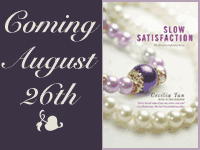From #RWA14 writeup of Paranormal Romance: Dead, Soft, or Rearing Up to Bite?
Paranormal Romance: Dead, Soft, or Rearing Up to Bite?
With Kate Douglas, Rebecca Zanetti, and Cynthia Eden
RWA 2014 Panel
So one thing I think I’ve learned about panels and workshops at RWA. Very often the people teaching them are not just “bestselling authors.” Very often they’ve got book sales in the millions, and the number of novels they have published is 50, 100, 200… These are not lightweights.
On this panel alone, which intrigued me because the rumor that “Paranormal is dead” has been going around New York publishing for a while now, we had Kate Douglas, author of 53 paranormals, 38 with New York publishers, but also some with Ellora’s Cave and some self-published, Rebecca Zanetti, a multi-bestseller with Grand Central, Entangled and Kensington, and Cynthia Eden, a two-time Rita award finalist who has been on the NYT, USA Today, and Digital Book World bestseller lists.
Here are just a few of the pithy and relevant things they said that I noted for myself. They began by explaining that they put the panel together because they were at a previous conference where there was a panel that said paranormal is over, you should run away from it as fast as you can. All the paranormal authors were talking afterward and saying to each other, are you doing okay? And they found out that actually they were all doing pretty well.
 “Look how crowded this session is,” Cynthia Eden pointed out. “I think that’s a sign how much interest there is in this genre. There is still a market.”
“Look how crowded this session is,” Cynthia Eden pointed out. “I think that’s a sign how much interest there is in this genre. There is still a market.”
Kate Douglas put the rumors of demise in perspective this way: “I had 31 [paranormals] with Kensington and sales suddenly tanked. But now there are so many successful self-published ones. I did a series with Kensington where they did one, I did one, then did the third, I did the fourth. And sales are comparable.” (Speaking of the Dark Wolf series.)
Rebecca Zanetti: “I heard yesterday that you ‘had to’ self-publish if you do PNR. But I have two friends who just sold PNR debuts to major publishers. Those readers are out there.”
So the consensus seems to be, no, paranormal ain’t dead, but it is a crowded field, and it is one that has changed massively and has seen some of the biggest shift to digital. “Three years ago I noticed my digital sales with a traditional house outpaced my print,” Eden said. Now her digital sales are three times what her print sales are.
So how can you be successful in paranormal? They suggested people research what’s hot. Douglas: “Listen to your readers. In groups on Facebook, on Twitter, wherever you feel comfortable, ask them what they want.” Zanetti: “Paranormal romantic suspense is definitely on the rise. We’re seeing a lot of supersoldiers and psychics. For a while they were down on psychics but now that door is open again.” Eden: “Look at the bestseller lists on Amazon, B&N, etc. and see for yourself what’s selling. Bella Forrest is dominating the lists right now with 5 or 6 books. Look at what she’s doing.”
Each of them has worked various angles to try to stand out from the field.
Eden: I stick to my “power hitters” so there’s always a vampire or a shifter in my pairing. One of them can be a traditional paranormal power hitter and then the other one can be something else new and different.” Also when I want to be a risk taker I can release a novella (20K words), see if it hits, and then develop a series. I do it on my own independently, but Rebecca has done the same through Kensington.
Zanetti: I approach writing like the Wild West. You need to write what you need to write.
Douglas: In 2003 a friend of mine started a press and said “break all the rules.” So I did. First of all I made a promise my books would not be monochromatic–they would reflect the world I live in, with people of all colors. Same with men who love men and women who love women. The editor, though, was like we can’t have this! You can’t break ALL the rules! But Margaret Reilly stuck by me: that was the first Wolf Tales book. I took it to Kensington and launched their Aphrodesia line with it.
Eden: In the past it was a hindrance to do mashups, because people had to know what shelf to find you on in the store. But now with digital, it’s a help not a hindrance. Five years ago it was problematic. Today it’s totally beneficial.



